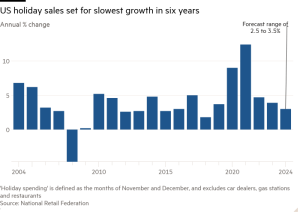Trump, Harris and peace in our time
Unlock the US Election Countdown newsletter for free
The stories that matter on money and politics in the race for the White House
“I will prevent world war three,” promised Donald Trump in a recent speech. The Republican candidate’s running mate, senator JD Vance, insists that Trump is “the candidate of peace”.
In a campaign full of outlandish claims, it would be easy to dismiss all this as meaningless bombast. But that would be a mistake. Beneath the slogans and the insults, the Trump and Harris camps have fundamentally different views of how to prevent the world from sliding into conflict.
Trump’s view of US foreign policy — like his “America first” slogan — harks back to a pre-1941 vision of the country’s role in the world. Like the groups that opposed its involvement in the first and second world wars, Trump’s instinct is to stay aloof from foreign conflicts. He is suspicious of what Thomas Jefferson, America’s third president, called “entangling alliances”.
The Republicans argue that the Democrats have become the party of foreign military intervention. They point to the fact that Kamala Harris has campaigned alongside the anti-Trump Republican, Liz Cheney. Last week, Trump denounced Cheney as a “war hawk”. (He also appeared to threaten to have her executed.) Vance has attacked Trump’s opponents for wanting “to get America involved in a ton of ridiculous military conflicts”.
The Harris camp, by contrast, is sticking with the post-1945 Washington consensus on national security. This holds that the lesson of the first and second world wars is that America will eventually get drawn into a European war. So the best way for the US to keep the peace is through a series of global military alliances, such as Nato, that deter and contain potential aggressors. The Democrats continue to believe that America should act as a kind of global police officer — using force judiciously to preserve the peace and the current world order.
This contrast in visions surfaced briefly in the chaotic televised debate between Trump and Biden in June. At one point, Trump suggested that the war in Ukraine is not really America’s concern because “we have an ocean in between”.
Joe Biden’s response was a classic statement of the post-1945 establishment view. “No major war in Europe has ever been able to be contained just to Europe,” the president insisted. Abandoning Ukraine would eventually lead to a bigger and more dangerous conflict: “Let Putin go in and control Ukraine and then move on to Poland and other places. See what happens then.”
Even though this exchange of views was brief and fragmented, Biden and Trump were touching on a crucial debate. Almost 80 years have passed since the end of the second world war, so it should not be surprising that the foreign policy doctrines bequeathed by that conflict are being increasingly challenged. America’s costly and ultimately losing wars in Iraq and Afghanistan have also soured much of the public on military interventions overseas. So can the old consensus hold?
The chances of having a serious debate are compromised by the internal contradictions in Trump’s views. The former president and his supporters are attacking Harris simultaneously for being a warmonger and for being weak in the face of America’s enemies.
Vance has tried to square the circle by suggesting that Trump’s policy is one of “peace through strength”. But there is a real tension between the hawks in the Trump camp — who believe that the US should adopt an even more muscular foreign policy — and “restrainers”, who want to cut back America’s military commitments overseas.
That tension comes to the fore over the issue of Iran and Israel. Many in the Trump team criticise the Biden administration for trying to restrain Israel’s military attacks on Iran. Behind closed doors, some top Trump advisers argue that Israel now has a unique opportunity to destroy Iran’s nuclear weapons programme — a military mission that would inevitably need US support.
The only person who could resolve this tension between the hawks and the restrainers is Trump himself. Dan Caldwell, a veteran of the Iraq war who works at the Defence Priorities think-tank, argues that Trump would ultimately side with the restrainers because his “instinct has always been to avoid a major war”.
But Trump appoints people to top jobs based on personal loyalty or whether they look the part — so there is no knowing how the hawks and the restrainers would balance each other out in a second Trump administration.
Harris and the Democrats think that both Republican camps could get America involved in another war. A full-scale attack on Iran would, they argue, lead inevitably to US involvement in another prolonged Middle Eastern conflict.
But the policy of restraint, as implemented by Trump, carries its own risks. Trump’s wariness of foreign entanglements is closely linked to his deep suspicion of many US allies, who he has often said are ripping Americans off. For the Democrats, however, a policy of “peace through strength” must rest on America’s network of global allies, which they see as the country’s greatest asset in any effort to deter Russia or China.
In any event, it is worth remembering that campaign arguments are an imperfect guide to what actually happens in the real world. In the 1916 presidential election, Woodrow Wilson campaigned as the peace candidate. A year later, he led America into the first world war.
#Trump #Harris #peace #time





